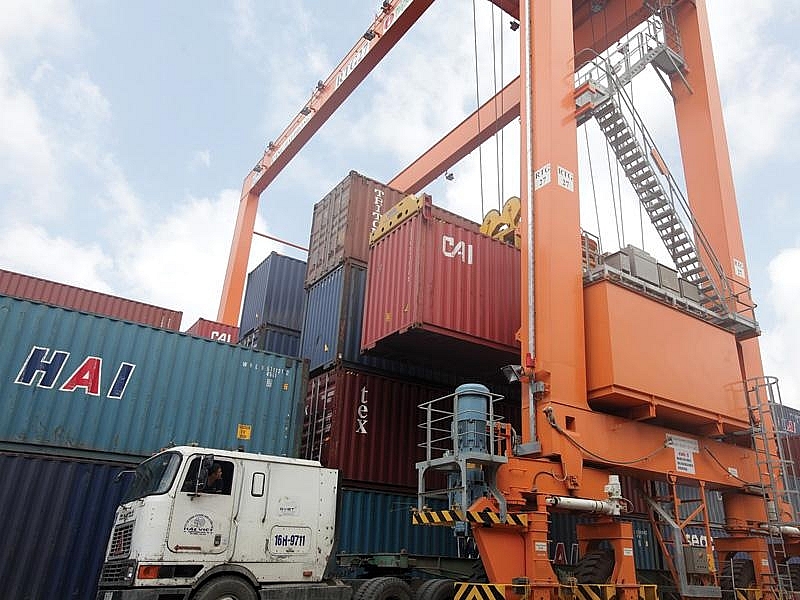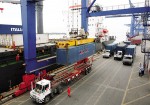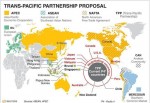Breakthrough reforms needed to keep CPTPP benefits
 |
| CPTPP will boost the exports and imports of Vietnam. Photo: Unloading cargo from a container at Haiphong Port, by Duc Thanh |
MPI warns of diminishing benefits
The signing of the CPTPP in March in Chile is expected to bring socioeconomic benefits for Vietnam, create a breakthrough in terms of investment, business, and export market expansion. However, in a number of documents MPI sent to the government recently, the ministry warns of a potential decrease of the gains from the CPTPP.
The issue pertains to the agreement’s stipulations on the rules of origin.
“Currently, the largest importers of Vietnamese goods are not CPTPP countries. Thus, if Vietnam does not implement breakthrough reforms, benefits from the CPTPP could be reduced,” MPI emphasised.
This is not a new concern, because issues over the origin of goods exported and imported into TPP members before and CPTPP members now, have been stressed for a while. Member countries will be able to access preferential rates under the agreement if export items use materials made in member countries of the CPTPP. However, in fact, Vietnam imports too much from China, which is not a member of the CPTPP.
According to the General Department of Vietnam Customs, Vietnam imported $58.228 billion worth of goods from China in 2017, including over $6 billion of fabrics. Major dependence on Chinese materials brings risks of commercial protectionist measures by the US. Furthermore, the benefits from the CPTPP will also go below expectations.
The solution for this problem is that Vietnam needs to start producing materials domestically through the development of domestic supporting industries. It is necessary to effect large-scale reform and development initiatives in order to maximise the benefits of the CPTPP, as well as raise added-value and take part in the global value chain.
What benefits lie in store for Vietnam?
If Vietnam makes reforms in time, how will the CPTPP benefit the Vietnamese economy? MPI has provided the answer for this question. According to the ministry’s report, signing and implementing the CPTPP will affect the domestic economy in a multitude of ways.
Removing or reducing tariffs will accelerate Vietnam’s economic growth and raise total export and import turnover. “If we removed and slashed tariffs at the same time as liberalised trade, the efficiency gains would be far better,” the ministry emphasised.
According to the World Bank, Vietnam’s GDP growth will be 1.1 per cent higher in 2030 in comparison to the scenarios without the CPTPP, which could reach as high as 4.5 per cent if productivity was raised and input costs for production reduced. Similarly, export turnover will increase by 2.4 per cent and import by 5.3 per cent.
MPI said that the CPTPP will not affect the state budget. “Reducing and removing tariffs may decrease budgetary revenue at the beginning due to decreasing revenue from exports and imports. However, this revenue will return in the future through the increase in total export and import turnover. Generally, the CPTPP is forecast not to affect the balance of the state budget much,” the ministry confirmed.
MPI said that the manufacturing sector, which is particularly labour intensive, along with the light and services industries, especially financial services, will benefit from the expanding market and raising export and import turnover. These sectors should enhance production to create more jobs and increase the income of employees.
Meanwhile, animal husbandry, food processing, and other capital-intensive sectors will suffer from limited negative impacts. Therefore, Vietnam should promote reforms to enhance gains and offset losses.
Tran Tuan Anh, Minister of Industry and Trade, confirmed at the press conference on the CPTPP in November that without the US, Vietnam’s gains are not as large as first expected, but this agreement will significantly affect the export market, strengthen reforms, and put competitive pressure on both enterprises and the economy.
In case the US returns to the CPTPP fold, the pressure to reform the Vietnamese economy will be even greater.
Economist Vo Tri Thanh also agreed with this point. The maintenance of high standards, general equilibrium, and the integrity of the TPP in the CPTPP will strengthen reforms in Vietnam. This is an intangible and uncountable benefit, but will significantly affect the country’s socioeconomic development.
 | CPTPP to be signed in March The eleven members of the Comprehensive and Progressive Agreement for Trans-Pacific Partnership (CPTPP) have already completed the negotiations and expect to sign the agreement on ... |
 | 12 becomes 11, and the TPP finds a way forward With the US withdrawal from the Trans-Pacific Partnership, the remaining 11 nations have decided to develop the pact into another version named the Comprehensive and ... |
 | “Reasonable chance” for TPP at APEC 2017 After US President Donald Trump announced the US’ withdrawal from the Trans-Pacific Partnership (TPP) Agreement, history’s largest trade deal to date congregating around 40 per ... |
 | TPP countries forge ahead without US The government officials in charge of trade from the remaining 11 member states of the Trans-Pacific Partnership Agreement have agreed to continue with the agreement, despite ... |
 | TPP member states commit to regional economic, trade integration Member states of the Trans-Pacific Partnership (TPP) committed to seeking a new path to promote regional economic and trade integration during a high-level meeting in ... |
What the stars mean:
★ Poor ★ ★ Promising ★★★ Good ★★★★ Very good ★★★★★ Exceptional
Themes: CPTPP
Related Contents
Latest News
More News
- NAB Innovation Centre underscores Vietnam’s appeal for tech investment (January 30, 2026 | 11:16)
- Vietnam moves towards market-based fuel management with E10 rollout (January 30, 2026 | 11:10)
- Vietnam startup funding enters a period of capital reset (January 30, 2026 | 11:06)
- Vietnam strengthens public debt management with World Bank and IMF (January 30, 2026 | 11:00)
- PM inspects APEC 2027 project progress in An Giang province (January 29, 2026 | 09:00)
- Vietnam among the world’s top 15 trading nations (January 28, 2026 | 17:12)
- Vietnam accelerates preparations for arbitration centre linked to new financial hub (January 28, 2026 | 17:09)
- Vietnam's IPO market on recovery trajectory (January 28, 2026 | 17:04)
- Digital economy takes centre stage in Vietnam’s new growth model (January 28, 2026 | 11:43)
- EU Council president to visit Vietnam amid partnership upgrade (January 28, 2026 | 11:00)

 Tag:
Tag:


















 Mobile Version
Mobile Version